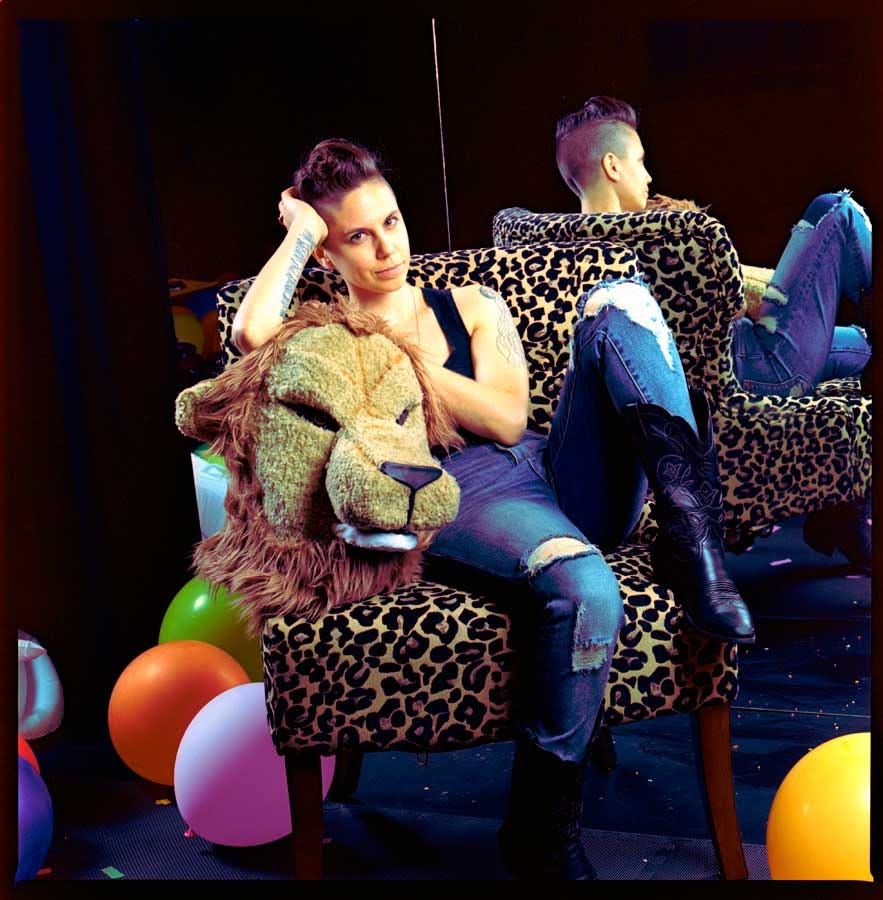Jen Silverman on fluidity, unhinged expression, and the versatility of Cate Blanchett
(plus more things you can read about in her debut novel)
Hi!
This week, I’ll be reviewing Jen Silverman’s debut novel, We Play Ourselves.
The book begins with Cass, a young playwright formerly hailed as “queer, feminist, and ready to spill the tea,” arriving in Los Angeles to avoid the fallout of a humiliating scandal. She’s quickly drawn into the orbit of her charismatic but morally questionable neighbor—a filmmaker named Caroline, whose current project centers on a group of teen girls in a violent, self-run fight club.
I’ll be sending a full review tomorrow!
In the meantime, I had the chance to ask Jen a few questions about bisexuality, the expression of anger, and Cate Blanchett. Enjoy!
— Becca
Photo by Peter Bellamy
Becca: Even though Cass is comfortable in her bisexuality, other characters generally want to label her as either gay or straight. Her parents are confused when she dates a man after dating a woman, and interviewers only want to know about her relationships with other women (not those with men) once they’ve defined her as a “queer artist.” What made you want to write about this confusion people seem to have over bisexuality?
Jen: I’m a queer writer whose experience—in terms of gender as well as sexual preference—is rooted in fluidity. I think that we’re in an extended cultural moment where people feel most comforted by checking a box about someone else, and so fluidity can engender a great deal of mistrust. I would say “confusion”, but that feels a bit more benign than the constant dubiousness that I’m talking about, the constant unwillingness to take you at face value.
There’s this idea that bisexuals are confused, which has always struck me as bizarre—desire has never felt particularly perplexing. What feels perplexing is the idea that I shouldn’t be attracted to the people I’m attracted to (of any gender) because I’m supposed to be enacting someone else’s idea of what a queer person “looks like.”
What became important to me in writing about Cass and Dylan is exactly what you articulate in your question—neither of them is confused about who they are, but rather the confusion comes from the outside.
Shortly after expressing her own anger in a very public (and arguably very unhealthy) way, Cass meets a group of teenagers in what’s essentially an all-girl Fight Club. Do you think Cass stands to learn anything from these girls who regularly embrace and express their rage?
Cass is drawn to them in part because she believes they haven’t been socialized to suppress their anger the way that she has, and she’s amazed by the idea that you can live this way. It feels like a revelation to her. I think there’s a whole new tolerance (and therefore vocabulary) for emotion that exists in the generation below mine. Sometimes that feels miraculous to me, and sometimes it feels a bit unhinged.
Cass’s relentless hatred of fellow playwright Tara-Jean Slater is delicious, even though it’s likely misplaced. What made you want to include a character like this, who seems to come into success so easily that it’s annoying?
Tara-Jean Slater is close to my heart as a character, not just because I’ve always been interested in who we choose as nemeses and what they say about us and our aspirations, but also because she is one of the few characters in the book who doesn’t really value success. Probably because it has come to her so easily. Her struggles—and Cass eventually comes to understand better what they are—have nothing whatsoever to do with her ambition.
A lot of the book focuses on the idea of “success”—the pursuit of it and what it really means. But by the end, it also seems to veer towards questioning whether success even matters at all. Do you think Cass would be better off if she gave up that pursuit?
I don’t know, we so rarely do what we would be better off doing. And there’s always something of value in a headlong pursuit even or especially when it takes you in a direction you never intended to go. I’m fascinated by how we define success, what each of us thinks is the pinnacle that we’re trying to reach. And—how much of that is our own aspiration vs how much is stuff we’ve unwittingly absorbed from our communities.
This question is mostly just for me, but Cate Blanchett is my biggest celebrity crush of all time—so I was thrilled to see multiple references to her as I was reading. I would love to know why, out of all possible celebrities, you chose to cast her as the lead in Tara-Jean Slater’s feminist take on The Odyssey.
I love that you are the target audience for this reference! Cate Blanchett is such a multi-faceted artist—she’s done everything from playing an elf queen to running a theatre to doing Julian Rosefeldt's art installation “Manifesto”—so it made sense to me that she might somehow get mixed up with Tara-Jean Slater. To be clear, I don’t know her at all, and if she ever crosses paths with this book, I hope she isn’t horrified.
Thanks for reading! I’ll be back in your inbox tomorrow morning with a full review of We Play Ourselves. Unless you don’t subscribe, in which case you can fix that right now:
Then, pick up a copy of the book at McNally Jackson.

